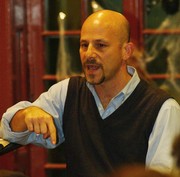Writer speaks on politics, advocacy
David Stone, founder of Stone Media, speaks at the Kelly Writers House yesterday evening on the topic of practical art of political speech.
The Daily Pennsylvanian
October 31, 2003

-
Photo by Tory Dowd/The Daily Pennsylvanian
When thinking of creative writing, fiction writers, poets and sometimes even journalists come to mind.
But as writer, producer and director David Stone said, "Most of us wind up writing for more or less utilitarian purposes."
And the goal is often the same -- "to advocate a certain point of view or convince others of a certain cause [for] action."
Stone discussed the role and influence of media on public advocacy work and politics, in a talk entitled "Fighting Words: The Practical Art of Political Speech" at the Kelly Writers House yesterday.
Stone stressed the importance of "translating difficult ideas into human stories in a way that is accessible." He added that in practical speechmaking -- especially in politics -- the audience cannot be forgotten.
Dealing particularly with political campaigning through the medium of television, Stone emphasized the "inadequacy" of the methods currently used.
"Television is really good at images, characters and stories," he said, but it fails to effectively convey concrete information -- especially in 30-second political advertisements.
The importance of character and personality in political campaigning is central, he said. To illustrate this point, he recounted his experience in aiding former Pennsylvania Senator Harris Wofford in his campaign.
Lacking significant previous political experience, Wofford succeeded because he "came off as a decent guy," Stone said.
"Character counts," he said, noting that, otherwise, all political advertising looks the same.
Stone also discussed public advocacy, the field in which he currently works. He noted the similarity between public advocacy and politics, saying that both involve "translating really complex information into not simplistic terms, but terms which touch the people in a way that is compelling and makes them take action."
He touched on the fragile balance between creativity and "the constant chase for funding" that is involved in the realm of public advocacy.
As Stone himself admitted, when he deals with topics of education, public health or government lobbying, he knows that "chances of a big payoff are very small."
But money is not what drives nonprofit advocacy, according to Stone. "Inspiration is the fuel," he said.
He also talked about the importance of non-commercial entities such as documentaries and advocacy work.
"A lot of good that goes on in society, goes on outside of the marketplace," he said.
In the informal discussion setting, Stone answered questions on a variety of topics, ranging from Democratic presidential candidate Howard Dean's surge in popularity to the overabundance of media accessibility in the modern world.
"I liked how he demonstrated that political advertising could be very effective when it shows sincerity and character," College senior Rafael Viturro said.
